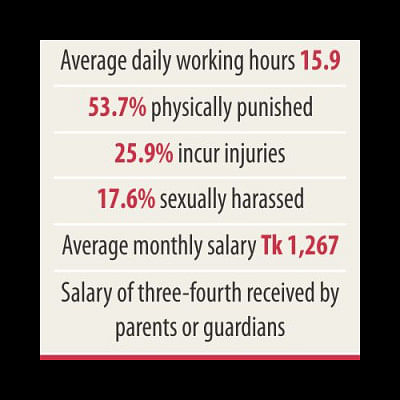Survey finds child domestic workers in hidden slavery

The daily total working hours for nearly 80 percent of child domestic workers (CDWs) are 14 to 18 hours, revealed a survey conducted on 1,230 CDWs in seven divisions of the country.
The long working hours often start as early as 5:00am and end at 1:00am, stated the report, based on data collected from Barisal, Bogra, Chittagong, Gazipur, Khulna, Munshiganj, Rajshahi, Rangpur and Sylhet cities, between November 2015 and January 2016.
Jointly funded by Manusher Jonno Foundation, Global March, educo, Terre des Hommes and World Vision, the report titled "Hidden Slavery Child Domestic Workers" was launched yesterday afternoon at the capital's Jatiya Press Club by Bangladesh Shishu Adhikar Forum, a network for child rights organisations.
Of the total numbers of CDWs, 87.7 percent were girls and 12.3 boys, 42 percent were between the ages of 12 and 14, followed by 15-18 age groups, which was 38.2 percent. Moreover, 17.2 percent were in the 9-11 age groups and 1.7 percent of the children were aged between six and eight.
While 25.9 percent of CDWs reported that they faced some injuries when asked about physical punishment, 10.6 percent did not respond while 53.7 percent said they were punished.
In response to "whether anybody touched or expressed ill motive", 19.6 percent female CDWs said "yes" and the persons involved in the illicit behaviour were mostly guards (30.6 percent), visiting relatives (23.1 percent) and neighbours (21.8 percent).
One limitation of the study was that 40 percent of the respondents were interviewed in front of their employers.
Researcher of the study, Prof Md Rezaul Karim, said many employers were unwilling to let their child employees take part in the survey.
The most common type of punishment was scolding, reported by 65.8 percent, and the most common reason for punishment was mistakes made in work. Bad behaviour by the wife of the house owner was reported by 67.9 percent of CDWs.
One-third of the children surveyed had no education, 55.9 percent had both parents alive, while 12 percent were orphaned.
Financial benefits received by CDWs ranged from Tk 500 to Tk 5,000 per month and the majority, 34 percent, received monthly salaries between Tk 501 and Tk 1,000, while 26 percent received Tk 1,001 to Tk 1,500. However, 7.5 percent received no financial benefits.
Prof AAMS Arefin Siddique, vice chancellor of Dhaka University, was the chief guest at the programme, chaired by Md Emrabul Huq Chowdhury, chairperson of BSAF.

 For all latest news, follow The Daily Star's Google News channel.
For all latest news, follow The Daily Star's Google News channel. 



Comments